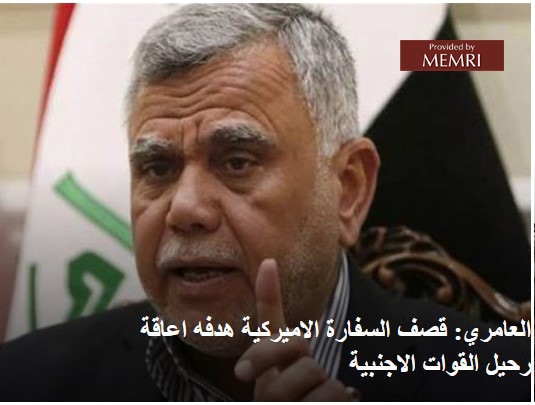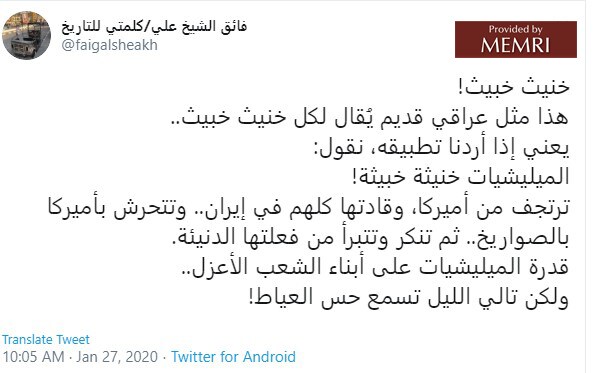On January 27, 2020, Iraqi security sources reported that a rocket attack on the U.S. Embassy in Baghdad had wounded one American and caused damage to property. The attack, the first of many in recent weeks that actually struck the Embassy, came two days after a massive anti-U.S. march organized by the Iran-backed Popular Mobilization Units (PMU) and by Iraqi populist Shi'ite cleric Muqtada Al-Sadr aimed at ending the U.S. military presence in the country.
Following the rocket attack and in an attempt to defuse any possible U.S. military response targeting them or their camps, and to further protect Iran from similar attacks, the Iraqi PMU commanders, along with other Iran-backed political leaders, denied any link to an "operation" against U.S targets, saying that such a "reckless" act would only undermine the Iraqi government's efforts of de-escalation in the aftermath of the U.S. drone strike that killed IRGC Qods Force commander Qassem Soleimani and Iraqi PMU deputy commander Abu Mahdi Al-Muhandis.
This report will examine reactions by the PMU, its affiliates, and pro-Iran Iraqi leaders and Iran-backed forces to the rocket attack on the U.S. Embassy:
PMU: 'We Have Nothing To Do With It'
The same day, Abu Ali Al-Basri, a senior leader in the PMU, said that "the group that attacked the U.S Embassy in Baghdad" represents only itself and that the PMU does not claim responsibility for any operation [of this kind]." He added: "Some parties are trying to drag the PMU into this case without providing any evidence."
He went on to say that the PMU fighters are showing a high level of discipline, noting: "We have meetings with them [PMU fighters] to provide them with instructions. There is a high level of coordination between the PMU and [the Iraqi] security apparatus, and we are keen to maintain that, as like we were instructed by the martyr Abu Mahdi Al-Muhandis."[1]

PMU logo. [Source: Al-hashed.net]
Hizbullah Brigades: 'Attack Embarrasses Iraqi Government'
Also on January 27, the PMU member group Hizbullah Brigades issued a brief statement, saying: "The timing of the attack that targeted the U.S. Embassy of Evil is inappropriate; it may embarrass the Iraqi government."[2]
Al-Nujaba: 'Targeting the U.S. Embassy Would Subject PMU Leaders To Similar Fate of Soleimani'
Even though the PMU member group Al-Nujaba Movement has so far not issued a statement about the attack, its January 27 editorial on its website highlighted its Movement's concern that the attack on the U.S. Embassy might cost the PMU dearly. Titled "Targeting the U.S. Embassy is a reckless act," it said that the attack would provide an excuse for the Americans "to strike senior leaders in the PMU, just as they targeted the two martyrs Abu Mahdi Al-Muhandis and Qassem Soleimani." It added that the attack on the embassy would embarrass the Iraqi government and push "the Sunni MPs to pursue their plan of forming a Sunni federal region." It concluded by condemning "the armed groups that decided to strike the U.S. Embassy," because by doing so they "they are contributing... to destroying the country."[3]

Editorial on Al-Nujaba's website (Source: Alnujaba.com)
SUPPORT OUR WORK

Asa'ib Ahl Al-Haq: 'The Rockets Used In The Attack Have Not Been Used By The Resistance [Groups] For Years Now'
Also that day, the Asa'ib Ahl Al-Haq movement denied any responsibility for the attack: "The rockets that targeted the Embassy of Evil in Baghdad is not the work of the Iraqi resistance factions." It added that the movement has "confirmed in the past that the resistance factions will not target the embassies and diplomatic missions in Iraq" and that the "the rockets used in the attack have not been used by the resistance [groups] for years now."
The statement denigrated the attack on the embassy, saying that had the PMU wanted to target U.S. interests in Iraq, it would have taken much more powerful action. "We have emphasized previously that our response to the assassination of Hajj Abu Mahdi Al-Muhandis will not be less than the reaction of the Islamic Republic of Iran to the assassination of Haj Qassem Soleimani."[4]
PMU Leader Hadi Al-Amiri: 'Government Needs To Work Hard To Protect Embassies'
Senior PMU leader Hadi Al-Amir, who also heads Fatah Alliance which is the second-largest political party in Iraq, and is the leader of the paramilitary Badr Organization, accused the Iraqi government of failing to adequately protect the diplomatic missions in the county. He noted in his January 27 statement: "The attack on the U.S. embassy last night is meant to obstruct the departure of foreign forces from Iraq," since "these acts of sabotage will only create a state of discord and thwart the Iraqi sovereignty project." He added: "We reject the attack on the embassies and foreign diplomatic missions in Iraq and we call on the government to work hard to protect diplomatic missions and expose those involved [in perpetrating them]."[5]

Hadi Al-Amiri (Source: Alnujaba.com)
Ammar Al-Hakim: 'Attack Undermines De-escalation Efforts'
Al-Hikma leader Ammar Al-Hakim tweeted a statement the same day, saying that he "rejects any attack against diplomatic missions in Iraq," calling on all parties "to respect the decision of the Iraqi parliament to end the foreign military presence on Iraqi soil." He also noted: "The repeated targeting of diplomatic missions threatens the efforts to defuse the escalation, raises the potential of Iraq turning into a battleground, and undermines the people's calls for reforms."[6]

Al-Hakim’s tweet (Source: Twitter.com)
Nuri Al-Maliki: 'Iraq Needs To Avoid Escalation'
Likewise, former Iraqi prime minister and leader of State Of Law parliamentary bloc Nuri Al-Maliki said in a January 27 statement that he rejected any attack on diplomatic missions in Iraq, and that in "this intense political time, there is a greater need to de-escalate the situation and strengthen Iraq's international relations on the basis of respect and mutual interests."[7]
MP Faiq Sheikh Ali: 'Pro-Iran Militias Are Behind This Attack'
On his part, Member of Parliament Faiq Al-Sheikh Ali, who is known for his anti-Iran sentiment, tweeted on January 27 that "the militias are malicious and sneaky, they are trembling with fear of America and of their [i.e. the militias'] leaders in Iran – but they harass America with missiles and then disavow their despicable act."

Ali’s tweet (Source: Twitter.com)




